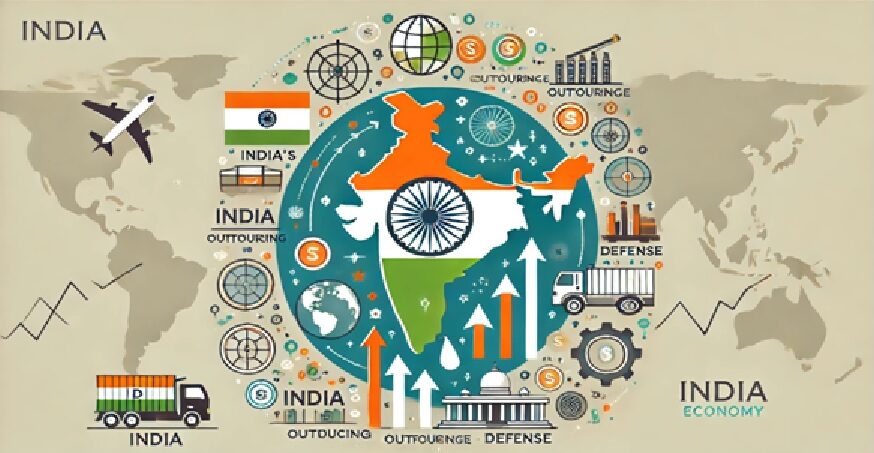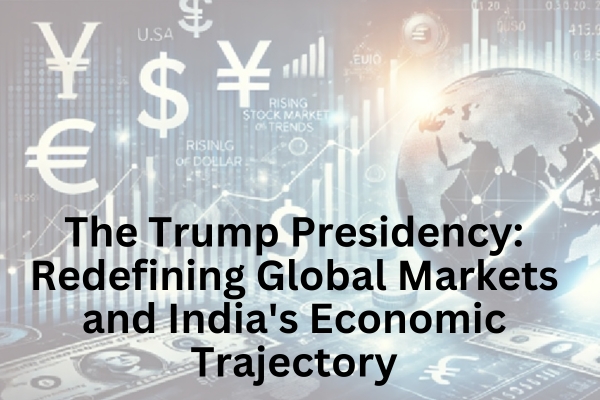The election of Donald J. Trump as the 45th President of the United States marked a pivotal moment in global politics and economics. His campaign promises, often characterized by populist and protectionist rhetoric, raised numerous questions about their potential implications for global markets and economies, including that of India. As the Trump era begins, here’s an analysis of what his policies could mean for the world economy and India’s financial landscape.
Impact on Global Markets

Rise in Volatility
- Global markets tend to react strongly to uncertainty, and Trump’s unorthodox policy proposals—ranging from renegotiating trade agreements to imposing tariffs—have already caused significant fluctuations in equities, currencies, and commodities. Investors are likely to stay cautious, and we could see sustained volatility as his policies begin to take shape.
-
Protectionism and Trade Wars
Trump’s “America First” agenda emphasizes bringing jobs back to the U.S. by renegotiating trade agreements like NAFTA. This approach could disrupt global trade dynamics, potentially igniting trade wars with major economies like China and the European Union. Emerging markets reliant on exports to the U.S. may feel the pinch.
-
Strengthening of the U.S. Dollar
With Trump advocating corporate tax cuts and increased fiscal spending on infrastructure, there’s potential for the U.S. dollar to strengthen further. A stronger dollar can have mixed effects: while it benefits American consumers, it can negatively impact emerging markets due to capital outflows and increased debt servicing costs.
-
Policy-Driven Sectors
Sectors like defence, infrastructure, and energy are expected to benefit from Trump’s policies. The promise of deregulation, particularly in the energy and banking sectors, could lead to a surge in U.S.-based investments.
As the Trump era unfolds, its implications are being felt across global economies, including India. With his emphasis on protectionism, renegotiating trade agreements, and reshaping U.S. foreign policy, Donald Trump’s presidency introduces a mix of challenges and opportunities for India. From the IT and outsourcing sectors to bilateral trade dynamics and inflationary pressures, the Indian economy finds itself at a crossroads, needing to adapt swiftly to a rapidly evolving geopolitical and economic landscape. Here’s a closer look at what this new era means for India and its economic
Implications for the Indian Economy

-
Impact on IT and Outsourcing
Trump’s protectionist stance, particularly his criticism of H1-B visa programs, could hurt India’s IT and outsourcing sectors, which rely heavily on the U.S. market. Companies may face higher costs and reduced access to the U.S. talent market, potentially slowing their growth.
-
FDI and Bilateral Relations
India has enjoyed strong bilateral relations with the U.S., but Trump’s transactional approach could shift dynamics. While his focus on curbing Chinese economic dominance may align with India’s interests, uncertainties around trade policies and foreign direct investment (FDI) norms remain.
-
Inflation and Oil Prices
Trump’s energy policies could influence global crude oil markets, which are a significant factor for India’s import bill and inflation. Any upward movement in oil prices would exert pressure on the Indian economy, potentially impacting fiscal deficit targets.
-
Stock Market Sentiment
Indian equity markets, like their global counterparts, will closely monitor Trump’s policies. Investors may adopt a “wait-and-watch” approach until there is greater clarity on the direction of U.S. trade and foreign policies. However, sectors like defence, which could benefit from increased U.S.-India collaboration, might witness a positive sentiment.
Opportunities Amid Challenges
While Trump’s policies present challenges, they also offer opportunities for the Indian economy. For instance, his stance on reducing dependency on China might open avenues for India to strengthen its trade relations with the U.S. Furthermore, sectors such as defence, infrastructure, and manufacturing could benefit from increased collaboration.
However, India must also brace for potential shocks, especially in sectors heavily dependent on the U.S. market. Diversification of trade partners, bolstering domestic demand, and enhancing global competitiveness will be critical for mitigating risks.
The Trump era is poised to redefine global economic trends and geopolitics. For India, the coming years will demand strategic agility to navigate challenges and leverage emerging opportunities. As policies take shape, staying adaptive and proactive will be the key to ensuring stability and growth in an increasingly interconnected world.
